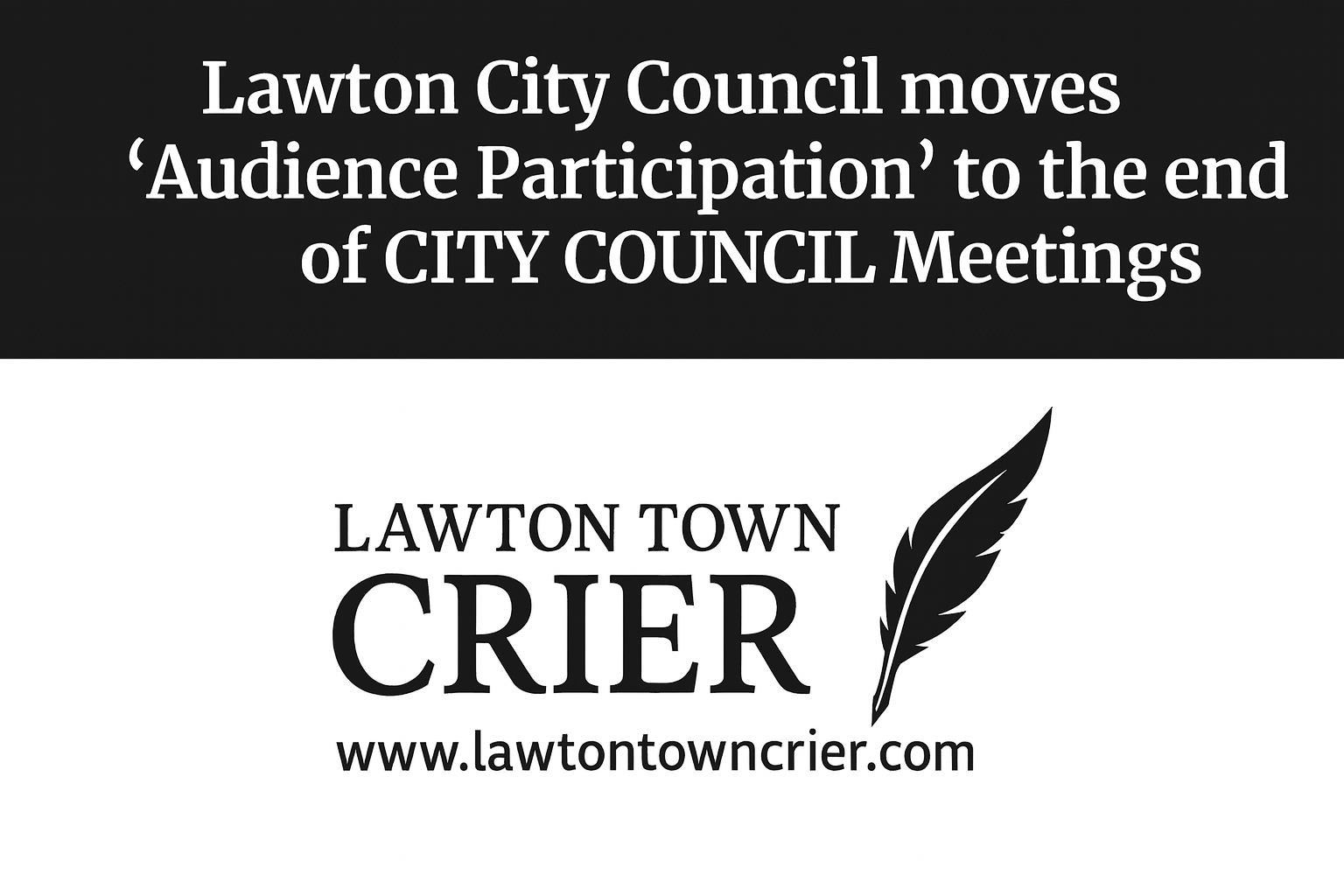LAWTON, Okla. — On September 9, 2025, the Lawton City Council voted to move citizen “Audience Participation” to the end of council meetings, a procedural change made the same evening polls were still open for Election Day. The action, introduced by Ward 1 Councilwoman Mary Ann Hankins-Booker and carried on a verbal vote, was part of a larger agenda item led by Mayor Stan Booker to review Council Policy 01-06, which governs council rules of procedure.
The policy review, framed as balancing “open access with orderly and constructive dialogue” under the city’s True North value of “Transparency and Trust,” drew both support and criticism.
Election Day Motion
Before Item #27 was reached, Councilwoman Hankins-Booker requested that audience participation be moved to the end of that night’s meeting because polls were still open. Mayor Booker recorded a verbal vote, noting that newly sworn Councilman Taron Epps was also a “yes.” The motion carried unanimously.
“We have a motion… the motion carries eight to zero.” — Mayor Stan Booker
Item #27: Council Policy 01-06
The formal agenda item read: “Discuss Council Policy 01-06 and take action as deemed necessary.” Policy 01-06 lays out the council’s rules of order, including procedures for addressing the body, time limits, and decorum during meetings.
Mayor Booker asked the City Clerk to survey peer cities. The Clerk reported:
- Norman, Moore, Midwest City: similar to Lawton’s prior structure.
- Edmond: allows public comment at the end of meetings.
- Enid: does not permit public comment.
The comparison suggested Lawton’s shift would align with at least one peer city.
Council’s Perspective
Several members defended the move as necessary to protect council business from disruption and political attacks.
Councilman Taron Epps argued that harassment of councilmembers during meetings discourages community members from seeking office.
“When we do personal attacks against council, you then restrict the pool of people that will want to run… There may be really good people who see that and say, ‘I’ll pass on that.’” — Councilman Taron Epps
Other members emphasized that legitimate service complaints — like water lines or trash pickup — can be addressed more effectively through city staff, while political attacks during audience participation erode order.
Mayor Booker said participation has been “weaponized” during campaign season, calling for rules that focus on problem-solving rather than political theater.
Public Reaction
During the discussion, three residents spoke out, criticizing the shift and warning that it undermines transparency. One said the council has grown quick to limit participation when faced with criticism. Another accused the body of enforcing decorum inconsistently.
One resident said the council claims to encourage participation, but in practice limits it when critical remarks are made, adding that such actions undermine transparency.
Speakers warned that pushing comment to the end discourages attendance, reduces visibility of public input, and diminishes accountability.
What Was Already in Effect
It is important to note that certain restrictions on audience seating and recording equipment were already in place prior to September 9:
- Front row seating reserved for staff, credentialed media, and invited participants.
- Recording equipment placement restricted to designated rear sections of the auditorium; barred from aisles, stairs, the dais, or balcony. ADA accommodations could be requested in advance.
- Communications & Marketing retained authority to operate in restricted areas.
These provisions were not adopted on Sept. 9, but they shaped the environment in which the meeting was held.
Legal Context
Under the Oklahoma Open Meeting Act (25 O.S. § 312), the public is entitled to record meetings as long as it does not disrupt proceedings. The Act does not require councils to provide a public comment period, but when they do, they may regulate timing and procedures.
Lawton’s decision to move participation to the end of meetings reflects the council’s discretion, but it also sharpens the debate over whether the city is expanding transparency or constraining it.
Why It Matters
For residents, the change means public comment now comes after all council decisions are made. Meetings often stretch for hours, making it harder for working people to stay until the end. Critics argue this discourages participation and makes public comment symbolic rather than impactful.
Supporters say the shift will preserve order and allow the council to focus on business, while still giving residents a forum to speak.
Looking Ahead
Mayor Booker has asked the City Attorney to explore further options for managing decorum and enforcing audience participation rules, including models used in other Oklahoma cities.
For now, Lawton residents must plan to remain until the end of meetings if they wish to be heard — a change that has already sparked fresh questions about the council’s commitment to its own True North values of Transparency and Trust.
***9/11/2025- Article was updated to correct spelling of Councilman Epps’ name.***
